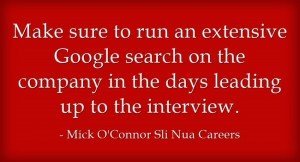By Mick O’Connor, Career Coach, Sli Nua Careers Athlone

1. As the interview draws closer, it’s important to stay alert and fresh rather than impeding your chances by cramming a book worth of sheets the night before. Gradually reduce the amount of information you’re studying to one page of bullet-point notes. This amounts to an abbreviated account of the information accumulated throughout your research: in total about 50 or 60 words relating to your skills and achievements. These will act as triggers on the day. You won’t refer to them during the interview, but they should be the last thing you read before going in the door.
2. Over the course of the days leading up to the interview, keep an eye on the media, checking the local and national newspapers, websites, social media and radio to spot changes in the company’s sector, whether they be new legislation or developments in rival companies. This is information you, as a potential employee, are expected to know about in the interview: failure on this front can be fatal.
 3. Similarly you should also keep in mind that all your research would be futile without having ample knowledge on recent developments within the company itself. Pay particular attention to any press releases, their website, Twitter and Facebook feeds and Linked In groups. There may be a possibility that the company has announced something big. In an era of rapid availability of news through social media, it would be expected that you would be familiar with any recent changes. To ensure you give the right impression, and don’t get caught out, make sure to run an extensive Google search on the company in the days leading up to the interview.
3. Similarly you should also keep in mind that all your research would be futile without having ample knowledge on recent developments within the company itself. Pay particular attention to any press releases, their website, Twitter and Facebook feeds and Linked In groups. There may be a possibility that the company has announced something big. In an era of rapid availability of news through social media, it would be expected that you would be familiar with any recent changes. To ensure you give the right impression, and don’t get caught out, make sure to run an extensive Google search on the company in the days leading up to the interview.
4. Practice, practice, practice. Speak answers as you drive along in the car (without threatening the safety of other road-users or yourself, I hasten to add). Cajole a friend or family member to put you through a mock interview – even just ten minutes ‘in the zone’ can help. Get in the habit of articulating your answers. Let the interview itself not be the first time you say what you want to say. Don’t rehearse or learn off lines, but do practice forming your answers. It will stand to you.
5. A tip that may seem quite obvious but frequently gets overlooked is to have your attire prepared in advance. Don’t subject yourself to a world of stress the morning of your interview because your shirt is a bit too tight around the collar or the business suit has creases that only a dry-cleaner can remove. Going in to the interview in an ill-fitting or poorly-ironed suit can diminish your self-confidence and give a bad impression to the employer. You want to be confident in your apparel – Roddy Collins, the soccer manager, always talks about looking good and feeling good in a nice ensemble of Louis Copeland ‘clobber’. Look good, feel good: walk into the interview feeling as if you’ve got the job.
6. On the day of the interview, travel light. Don’t weigh yourself down with clunky bags or briefcases, unless you have to bring in a portfolio. Trust your memory at this point. If you have the preparation done, if you know what you want to tell them, and if you have the stories ready that help to illustrate your ability, the whole affair should go swimmingly.
Mick O’Connor is a Career Coach with Sli Nua Careers and works out of Athlone. You can read more abouthim, and make a booking HERE for CV Preparation and Interview Training.
More articles fromhis blog can be accessed HERE